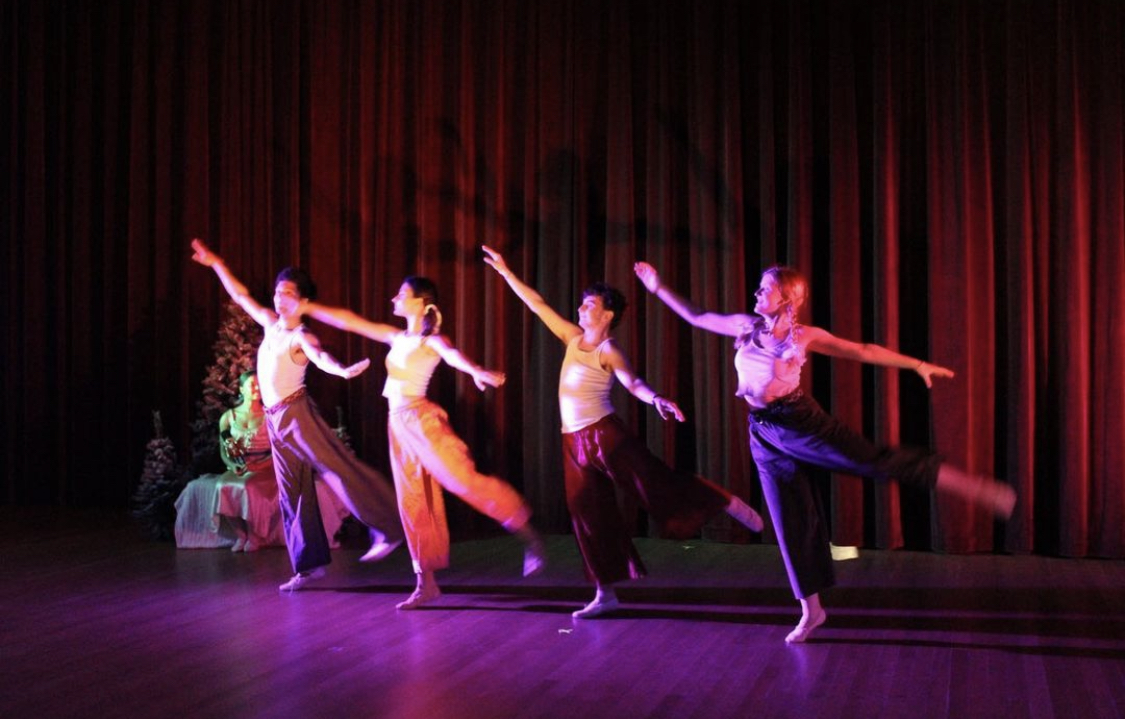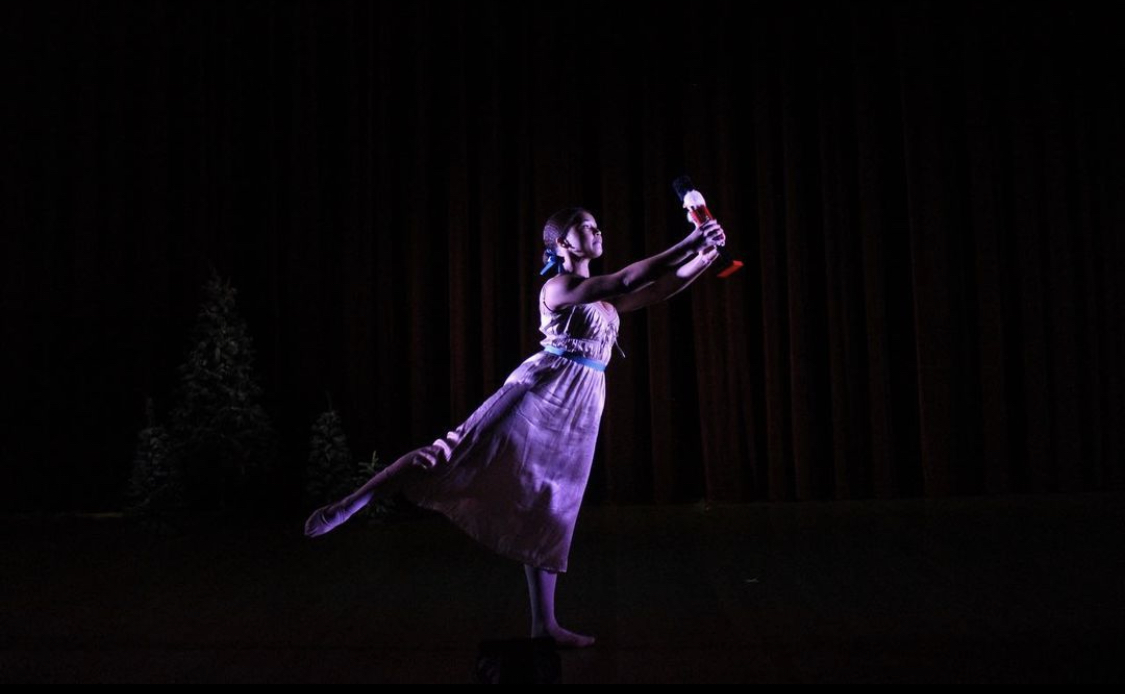
c/o Spike Tape
Spike Tape’s production of “The Nutcracker” offered a festive reprieve from the looming stress of finals, performed in Beckham Hall on Dec. 1 and 2. From the moment Clara (Juno Wright ’27) waltzed onto the stage, clutching the titular Nutcracker, the audience was swept into a world of Christmas magic. Everything on the stage glittered, from the dancers clad in sparkly tutus to the Christmas trees glistening with snow that flanked them.
Pyotr Ilyich Tchaikovsky’s “The Nutcracker” is the story of a little girl, Clara, who receives a nutcracker from her godfather, with whom she proceeds to embark on a mystical adventure. This particular production focused on Act II of the ballet, wherein Clara and the Nutcracker interact with the various residents of a winter wonderland. This production marks the second time “The Nutcracker” has come to the University, following a 2015 production choreographed by Rachel Davis ’18 and produced by Second Stage, a no-longer-extant student theater group on campus.
For many dancers, performing in the show is an integral part of the holiday season.
“I auditioned for ‘The Nutcracker’ because I have been doing ballet for quite a while, and I hadn’t performed classical ballet since 2019!” Celine Bassman ’24—who played the Sugarplum Fairy and a snowflake—wrote in a message to The Argus. “I’d been performing in the Nutcracker since I was eight, and I have missed it dearly, especially because it’s a production I thought I would be performing until my mid-thirties.”

c/o Spike Tape
This was a sentiment echoed by many of the dancers involved in the production, and was, in fact, the reason for its production at the University. The show was the brainchild of Meera Das ’26 and Natalie Silver ’26, both of whom are ballet dancers themselves.
“Natalie and I were talking about [performing in ‘The Nutcracker’] one night in our room, and we thought why not just do it ourselves?” Das wrote in an email to The Argus. “That was the initial thought, and it all started to come together after that.”
One of the major challenges was figuring out how to secure the lighting, costumes, and sets. This is where Spike Tape came into the equation.
“We decided to do it through a theater club as performance wise, a ballet has more similar needs to theater shows than other dance shows as it involves costumes, lights and set design, and as well, it is telling a story,” Silver explained in an email to The Argus.
As producer, Spike Tape helped Das and Silver figure out many of the logistical components of putting on a theatrical production, including finding people for prop and costume design.
Another difficulty was grappling with the show’s complicated history, namely that some of the original choreography was appropriated from other cultures, something both Das and Silver were very aware of as they developed their own choreography.

c/o Spike Tape
“To appreciate the cultures represented as opposed to appropriating them with our choreography, we decided to work with other students who are trained in other traditional dance forms to create choreography that was a fusion of ballet and other dance styles,” Silver wrote. “Meera collaborated with Akhil Joondeph [’26] to choreograph a dance that combined ballet with traditional Indian dance elements. We called the dance ‘Assamese Tea’ after the region of India where Meera’s dad is from. I collaborated with Crystal Peña [’24], the head of the Latin and Ballroom dance club, to choreograph the ‘Spanish Dance’ where we added a section of Bachata, a dance style that originated in the Dominican Republic, in between sections of more traditional ballet choreography.”
After a short introductory speech by Das and Silver, the Snow Queen (Anna McDonald ’26) and her Snowflakes swept the stage in a flurry of white, evoking all the giddy excitement of the first snow of winter as they twirled and leapt through the air.
The stage was then taken in turn by the Sugarplum Fairy (Bassman), the Spanish dancers (Lael Blackmore ’26 and Henry Ewing-Crystal ’26), Coffee (Kiara Reeves ’26), the Candy Canes, the Marzipans, the Polichinelles, Dewdrop (Nini Hayes ’27) and her Flowers, and the Cavalier (also played by Ewing-Crystal).
Bassman was the picture of poise as the Sugarplum Fairy, deftly executing precise turns in a shimmering blush and gold tutu. Hayes was another standout, evoking all the delicate beauty of her character’s namesake as she pranced elegantly along the stage, with the dancers playing the Flowers fanning out alongside her in a sea of cheery purple. The small groups of dancers playing traditional Christmas sweets, including the Candy Canes and Marzipans, were likewise mesmerizing in their grace and synchronicity.
Perhaps most key to the production’s success, however, was the infectious joy of the dancers involved. Their passion for the art and their exhilaration at being able to bring this holiday classic to the University was evident in the beaming grins worn by every cast member throughout the show, despite the rigor of the dances being performed. Ewing-Crystal cited the camaraderie between the cast members as being his favorite part of the production.
“Everyone in the cast and crew was so kind, and I really enjoyed getting to know everybody and becoming friends with so many amazing people,” Ewing-Crystal wrote in an email to The Argus.
This was due in large part to the fact that the show provided a space for dancers of all skill levels to showcase their talent and passion for ballet. Some members of the cast were seasoned dancers—such as Ewing-Crystal, who has been dancing ballet since age seven—while for others, the show was their first time performing in a ballet production. Das cited this inclusivity as being crucial to the ethos of their production.
“The whole idea of this show was to bring ‘The Nutcracker’ to Wesleyan in a new way, so we didn’t cut anyone,” Das wrote. “We rather worked with people of different skill sets to make something that would make everyone shine.”
Impressively, and perhaps paradoxically, this only served to contribute to the cohesiveness of the show, as the admiration each member of the cast had for their fellow dancers, regardless of prior experience, was evident throughout. Looking forward to the future, Das and Silver say they currently have no plans to make the ballet an annual tradition.
“Because the show was produced by Spike Tape, it would not be possible to do it with them again next year because they choose new shows every semester and there are so many show proposals,” Silver wrote. “The only way for it to happen again would be to establish a new club specifically for doing ballets so that it would be an annual thing.”
Both Das and Silver noted that the time-consuming nature of directing the production would likely prevent them from being involved again in the same capacity, though Das left room for the possibility of re-staging a production with similar choreography to this year’s.
Overall, “The Nutcracker” was a smashing success, perfectly capturing the jubilant spirit of Tchaikovsky’s classic work and serving to unite its audience members through pure, unadulterated holiday cheer. Between the set, which invoked a cozily nostalgic, “Christmas Carol”-esque setting, the eye-catching effervescence of the costumes, and the sheer joy and technical skill of the dancers, it was impossible to leave the show without a newfound sense of excitement for the upcoming holiday season.
Anna Thomas can be reached at asthomas@wesleyan.edu.
5 Comments
Health News
Certainly, a great deal remains unknown regarding this topic. Your arguments are well-reasoned and persuasive. Your sharing of the content was really appreciated; each quote was fantastic. Persist in sharing and never cease inspiring others.
temple gmail
Very well presented. Every quote was awesome and thanks for sharing the content. Keep sharing and keep motivating others.
حلول تركيبات الأنابيب
The factory’s commitment to innovation is reflected in their continuous research and development efforts to enhance the design and functionality of their HDPE and uPVC fittings. Elitepipe Plastic Factory
uPVC pipe services in Iraq
Customers can rely on Elitepipe Plastic Factory’s technical expertise and dedicated customer support to assist them in selecting the most suitable fittings for their specific needs. Elitepipe Plastic Factory
VigorVita CBD Gummies
Admin, this was really amazing. Thank you for your kind considerations.